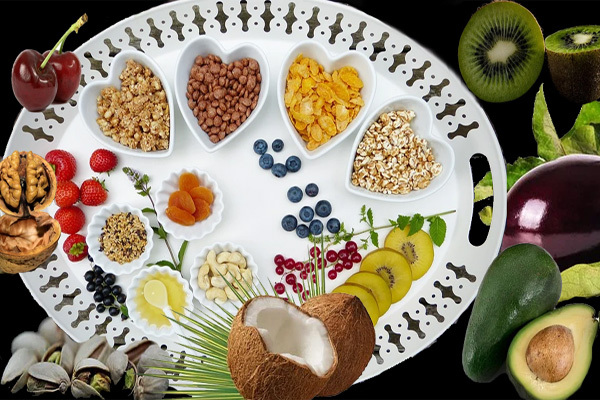Buy an array of colorful fruits and vegetables as fresh as possible to get the full range of protective vitamins and minerals before they have chance to deteriorate. For this reason, as well as for economy, get into the habit of shopping and eating seasonally when fruits and vegetables are at their best and cheapest.
Eat plenty of raw fruits and vegetables to get the most amount of nutritients as possible.
If whole fruits are too much effort to prepare, or if you live alone, buy small containers of ready-to-eat fresh fruit.
Complex carbohydrates are economical, tasty, and they will fill you up while adding valuable vitamins and minerals to your diet. They should make up about 50% of your daily energy intake.
A well balanced vegetarian diet is rich in fibre. Fibre is an aid to digestion and protection against disease. Fibre acts as a broom in our digestive system and helps in bowel moving. The recommended daily intake is between 20 to 30 grams. Eat foods rich in fibre like: fresh or dried beans and peas, spinach, carrots, corn, cabbages, potatoes, fresh fruits (apples, oranges, bananas), cereals (oats, whole grain wheat).
Flaxseed oil is the best vegetarian source of omega 3s. Flaxseed oil is sensitive to heat and light, so it's not good for cooking. Drizzle oil over salads or other prepared dishes. Recommended dose is one tablespoon a day.
Drink wheatgrass juice, one of the most nutritionally dense foods available today. Start with low dose (one ounce a day) so your system doesn't get shocked. Drink it fresh (once juiced it loses its nutrients), working up to 2 ounces per day.
Use a fork to stir sautéing zucchini, potatoes, carrots etc. Spoons tend to break them.
Sauté vegetables in broth or fruit juice instead butter or oil - you get moisture without fat.
When buying tofu to make vegan desserts always select firm tofu. Firm tofu will give you greater control, since you can always add liquid to soften it.
When baking apples, use apples that will hold their shape when cooked, such as Granny Smith, Golden Delicious, Jonagold or Rome Beauty. Also make lots so you can have leftovers for other yummy dishes.
To retain the maximum vitamins and minerals in fresh fruits and vegetables, don't soak them in the water, just wash them quickly and use them unpeeled if possible.
Introduce more dark leafy green vegetables like spinach or rapini by adding them to salads, soups, or a stir-fry.
As time saver, buy precut veggies which are great for stir-frying, dipping and munching.
Freeze fruits and vegetables when they are in season and enjoy them throughout the year.
Try combination dishes like casseroles or a stir-fry to introduce different tastes.
Almonds are among the richest food sources of the antioxidant vitamin E. One-half cup provides twice the RDA, which not only mops up free radicals but promotes healthy skin and hair. Like olive oil, almonds are great in lowering artery clogging LDL cholesterol. A cup of almonds contains as much calcium as a cup of milk, plus 500 mg of potassium, 20 grams of fiber and other nutrients, including folate, iron, magnesium, zinc and the B vitamins.
Remember that variety is still the best guarantee of a healthy, balanced diet.


